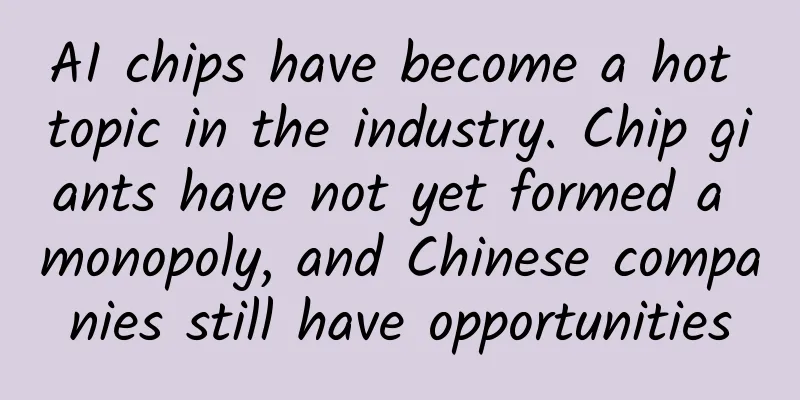AI chips have become a hot topic in the industry. Chip giants have not yet formed a monopoly, and Chinese companies still have opportunities

|
Currently, AI has become a hot topic in the industry. Not only are a large number of start-ups emerging, but Internet technology giants are also strengthening their layout in the field of AI. Recently, Huawei’s high-profile announcement of entering the AI chip market has attracted widespread attention. Recently, Xu Wenwei, President of Huawei's Strategic Marketing, said in a speech that in the next decade, AI will be dominated by the industry. By 2025, the global AI market space will reach 380 billion US dollars, of which 90% will come from the enterprise market. AI has begun to sweep across all walks of life, and automobiles, medical care, and finance have all become targets of AI transformation and upgrading. For example, international chip giants such as Nvidia, Intel, and Qualcomm are already doing their best to deploy autonomous driving, hoping to seize the initiative in future market competition. However, no company currently has a monopoly in the field of AI, and competition in the field of AI has just begun. On October 11, Huawei and Audi officially announced their cooperation plan in the field of intelligent connected vehicles. Huawei's MDC mobile data center has been integrated into the Audi Q7 prototype to serve autonomous driving in urban environments. Unlike other AI scenarios, the scenario-based demands of the automotive market are very specific, and there are fewer situations that require adjustments in the short term, which facilitates the research and development of related chips and algorithms. Among the three major scenarios for the implementation of AI, the medical industry belongs to the expert experience-based scenario. In addition, there are massive repetitive scenarios (such as image processing) and multi-domain collaborative scenarios (such as urban smart transportation systems, modern manufacturing, etc.). The underlying chip is the most basic part of the AI UI component industry chain. AI chips can be divided into the neural network training layer, cloud inference layer, and device-side inference layer. According to Gartner estimates, the market size of AI chips in 2017 was US$4.8 billion, and is expected to reach US$14.6 billion in 2020, of which cloud applications are expected to reach US$10.5 billion. As a winner of Toutiao's Qingyun Plan and Baijiahao's Bai+ Plan, the 2019 Baidu Digital Author of the Year, the Baijiahao's Most Popular Author in the Technology Field, the 2019 Sogou Technology and Culture Author, and the 2021 Baijiahao Quarterly Influential Creator, he has won many awards, including the 2013 Sohu Best Industry Media Person, the 2015 China New Media Entrepreneurship Competition Beijing Third Place, the 2015 Guangmang Experience Award, the 2015 China New Media Entrepreneurship Competition Finals Third Place, and the 2018 Baidu Dynamic Annual Powerful Celebrity. |
<<: Tesla's new progress in localization: $145 million to purchase factory land
>>: Electric vehicle fires are not a technical issue, quality control and design are the key
Recommend
Consumer Reports tests Model 3 fully autonomous driving: Not worth it
There is a saying circulating on the Internet: &q...
WeChat Mini Programs teach you how to connect online and offline channels
After the emergence of WeChat mini-programs, soci...
Check out the four growth strategies used by big companies like Tencent and NetEase
Behind the success of large companies, in additio...
Be careful when eating at gatherings. How to save yourself if food gets stuck in your throat?
If you encounter food choking, don't try any ...
Illustration hand-drawing course of the twelve constellations, can be sold or self-taught
Illustration hand-drawing courses for the twelve ...
Tesla to produce Model 3 in China by the end of the year: Musk and NIO's "China War"
Elon Musk is a man who has almost no secrets. Whe...
Which "food assassins" are clearly carcinogenic? Every bite you eat may be nourishing cancer cells!
Which “food assassins” are clearly carcinogenic? ...
These 12 obvious signs are signs of physical aging! Timely conditioning can slow down the aging process
What changes will occur in the body when aging be...
KOL marketing skills!
KOL has undoubtedly transformed the entire market...
Advertising tips for education, tourism and gaming industries!
If June is a carnival for e-commerce advertisers,...
Sorry Apple Pay, bank card payment is pretty good
[[129071]] Before I start, I want to apologize to...
Community operation: 2 tips to increase community activity!
However, the biggest dilemma faced by most groups...
Liquid rocket reuse, where to focus next?
Recently, a type of liquid oxygen-kerosene engine...
Even if no one watches TV, TV media is still better than new media
TV has become a standard feature of the living ro...









